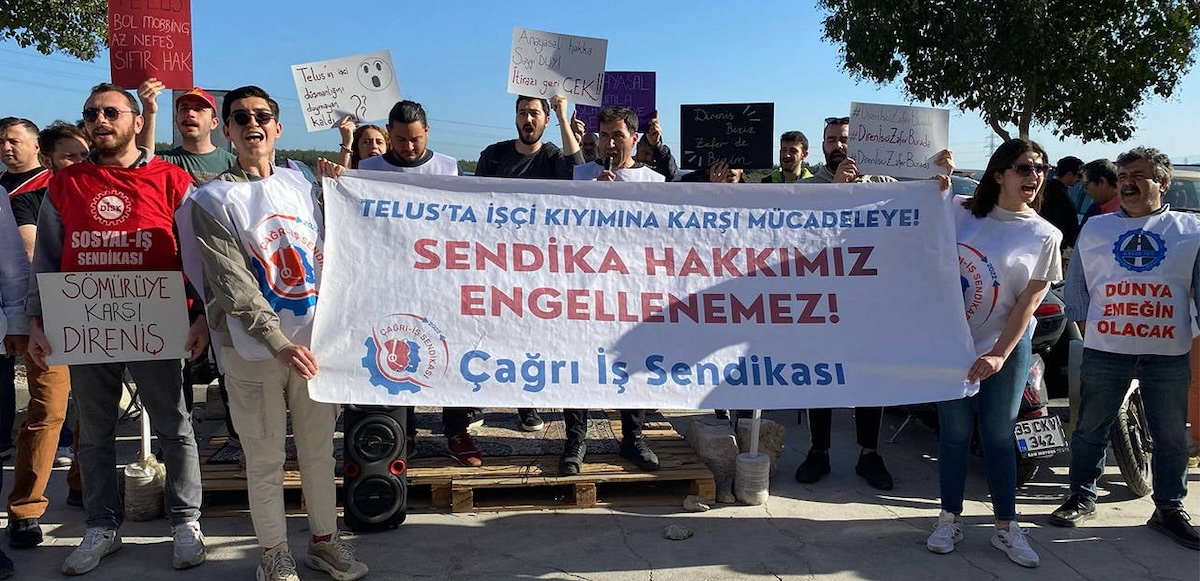TikTok Moderators Fight against Trauma and for a Union

Workers for Telus in İzmir, Turkey, protest their conditions. Telus employs around 1,000 moderators to filter out disturbing TikTok material. Photo: Birgun Daily
TikTok, the social media giant that keeps billions scrolling, relies on a vast, largely invisible workforce. Behind the joy and entertainment are workers—content moderators, engineers, outsourced staff—facing long hours, psychological strain, low pay, and a lack of rights.
TikTok workers from Turkey to Colombia are pushing back against this exploitation.
TikTok outsources much of its content moderation to firms like Telus International. In İzmir, Turkey, Telus employs around 1,000 moderators to filter out disturbing TikTok material – such as videos depicting or promoting child abuse, suicides, terrorist propaganda, or animal cruelty. Most of these workers earn barely above the national minimum wage.
“The work scars you,” said one İzmir-based moderator. “You see violence, abuse, death—then you go home and pretend it’s a normal day.”
A worker involved in the ongoing protests against TikTok and Telus in İzmir said, “At first, you think you’re just sitting at a desk. But the images you see every day—mutilated bodies, exploitation, hate—change how you see the world. You stop reacting. You stop sleeping.”
Several moderators said they took antidepressants just to cope. Others described colleagues fainting, having breakdowns, or, tragically, taking their own lives.
Support is minimal. “We’re allowed to see a psychologist—but only during our breaks,” one worker explained. “If you use too many ‘well-being minutes,’ they mark you as underperforming.”
Legal Limbo
In early 2024, Telus workers in İzmir began joining Çağrı-İş, an independent union representing call center workers. By summer, they had passed the threshold for legal recognition. Instead of engaging in negotiations, Telus challenged the union.
At least 15 workers were dismissed, many under Turkey’s controversial “Code 25,” which denies workers severance or unemployment benefits. One worker was fired after attending a peaceful protest. Her dismissal letter cited a “department reduction.”
“I wasn’t warned. I wasn’t coached. I wasn’t even on a performance plan,” said another fired worker. “They just got rid of me because I supported the union.”
Telus claims all firings were due to misconduct or restructuring. But the union argues it was retaliation.
Workers also say Telus exploited a legal loophole by arguing that call center employees should be classified not as “communications” workers, who are allowed union representation, but as “general office” workers, who are not. That reclassification was upheld by Turkey’s top administrative court.

SUPPORT LABOR NOTES
BECOME A MONTHLY DONOR
Give $10 a month or more and get our "Fight the Boss, Build the Union" T-shirt.
In Colombia, moderators at Teleperformance—a similar outsourcing firm—reported near-identical union-busting tactics: intimidation, dismissals, and surveillance. In both countries, union leaders were followed by private security and even reported to the police.
Job Hazards
Experts on digital labor say content moderation is one of the most mentally dangerous jobs today. They compare it to coal mining: Just as miners inhale coal dust, moderators absorb psychological trauma.
TikTok and Telus both claim to offer counseling, blur filters, and algorithmic support. But moderators say these tools are limited and often used to create the illusion of care—while “key performance indicators” like speed, accuracy, and daily quotas, remain rigid and unforgiving.
“We can take wellness breaks—but if we do, we can’t meet our accuracy targets,” said one moderator. “And if we don’t hit 94 percent, we lose bonuses—or worse.”
Built on Secrecy
Platforms like TikTok and Meta rarely disclose how many moderators they employ, or through which companies. Most contracts include strict non-disclosure agreements (NDAs) that silence workers.
Many moderators are migrants. In Telus offices in Germany and Portugal, workers often have temporary visas, and are afraid to speak up for fear of deportation. As one researcher put it, “Their contracts are NDAs disguised as employment agreements.”
At a 2023 summit of content moderators in Berlin, participants developed a set of demands—including better pay, psychological support, and recognition of their work as hazardous—and presented them at the Bundestag. In response, Telus suspended one of the presenters for breaching his NDA.
Big Tech regularly hides behind layers of outsourcing and bureaucracy to avoid accountability.
Growing Pressure
Fortunately, TikTok workers are not alone. UNI Global Union and the United Steelworkers have backed campaigns to support Telus moderators in Turkey and elsewhere. In Canada, labor groups have demanded that Telus respect workers' rights not just at home, but abroad.
International campaigns through LabourStart have sent thousands of protest messages to Telus management. Turkish unions DİSK/Sosyal-İş and Çağrı-İş continue to organize, protest, and challenge unfair dismissals in court.
“This isn’t heroism,” said a moderator and union activist in İzmir. “This is citizenship.” A union win, they added, “won’t be personal—it’ll belong to the whole working class.”
Kıvanç Eliaçık is director of the international relations department of the Confederation of Progressive Trade Unions of Turkey.




